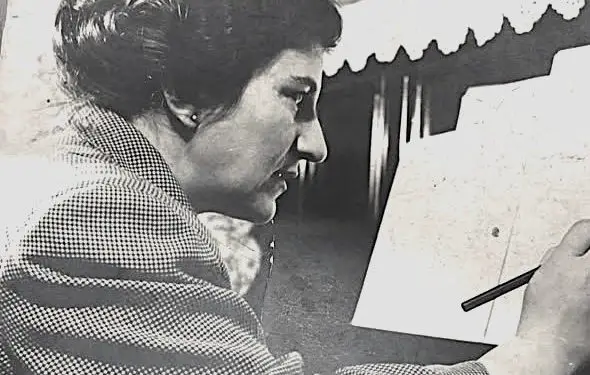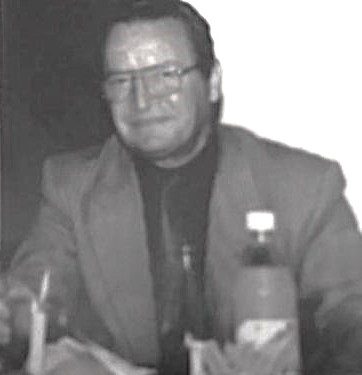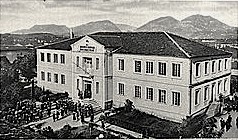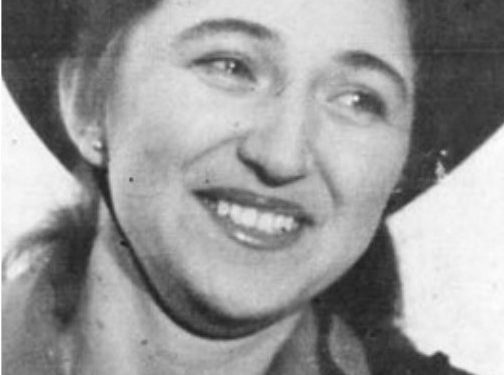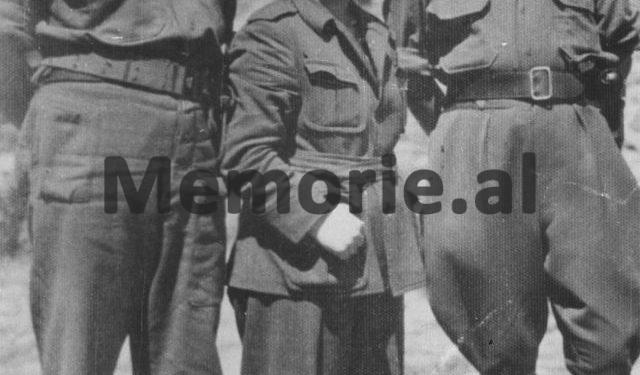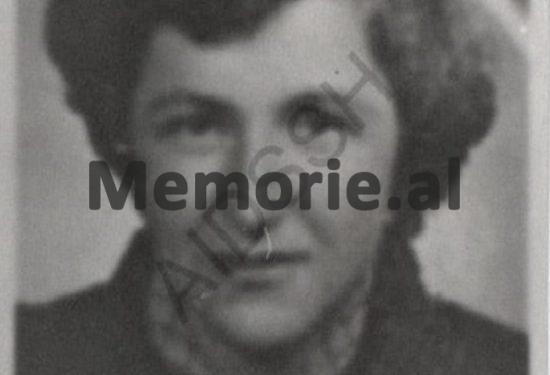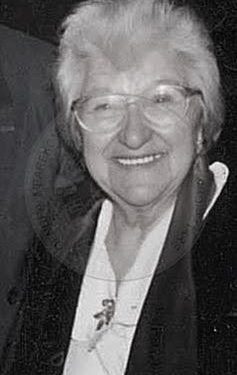Memorie.al / Starting from this issue, we are beginning the publication of a long interview with the “People’s Artist” and “Great Master of Work,” the distinguished composer Dhora Leka. The conversation with her started a long time ago, but almost nothing has been published, because her wish was to finish her memoirs, summarizing them in a special book titled; “Moments and Impressions from My Life”. The book has been reworked several times and has been confronted with both archival documents and her family’s personal archive. Today we are publishing the first presentation with the distinguished composer, which will continue for several issues.
THE FAMOUS ARTIST WHO WAS SENTENCED TO DEATH
“People’s Artist,” Dhora Leka, was born in Korça on February 23, 1923, into a simple urban family. She completed her high school studies at the “Queen Mother” Women’s Pedagogical Institute in June 1942. For her participation in revolutionary activities, she was expelled from this school twice. She was appointed a teacher in the village of Plasë in Korça, in the school year 1942-1943.
From the end of 1942, she went underground. Later, she became a partisan and with a weapon in hand, she took an active part in the National Anti-Fascist Liberation War, until the day of Liberation, on November 29, 1944. Starting from the month of 1942, Dhora Leka, dedicated herself to composing partisan songs.
Her songs such as: “The Call to Arms,” “Youth-youth,” “From the boyish chests,” “Those striped peaks, how they thunder,” “Revenge,” and many others are well known throughout our country. She is the author of most of the songs of the National Anti-Fascist Liberation War.
From 1948, until November 1953, she completed her higher studies at the “P.I. Tchaikovsky” Conservatory in Moscow, for composition and upon her return to the homeland; she was appointed a lecturer at the “Jordan Misja” art high school in Tirana. In February 1954, at the Conference of Artists, she was elected Secretary General of the League of Artists.
In May 1956, for her active participation in the events of the Conference of Tirana, she was expelled from the ranks of the Party of Labor of Albania (she had been a member of the Albanian Communist Party since August 1942) and was dismissed from the position of secretary of the League of Artists, as well as from its ranks. In July 1956, she was interned in Gjirokastër.
In May 1957, she was arrested and sentenced by the High Military Court to 25 years of imprisonment, confiscation of property, removal of the military rank of “captain,” and of orders and medals, copyright, and electoral rights after serving her sentence. The accusation, “For high treason against the Homeland and the people, and an anti-party element”. The prosecutor in his indictment, demanded for Dhora Leka, the capital punishment: death!
Benefiting from the credited amnesties in November 1957, 1959, 1962, she was released from prison in November 1963 and was forcibly sent to live in the city of Berat with limited movement. In February 1966, she was interned in Seman of Fier. In December 1970, she was appointed to live in Fier, again forcibly, where she worked as a seamstress.
On January 13, 1983, she was interned for the third time, in the village of Sheq-Marinës in the Fier district, where she lived until June 1991 and only with the overthrow of Enver Hoxha’s dictatorship, Dhora Leka returned to Tirana free, optimistic, energetic, active and full of beautiful plans for the future.
She carried over 85 years on her back, no small feat for a woman who, after fighting with a weapon in hand for the freedom of her homeland, had become familiar with a long and relentless persecution by the dictatorial regime. She had thought that after the war, freedom would come together with a new democracy.
But this did not happen. The wave of terror over “enemy groups” and people who did not do the party’s work, did not spare Dhora Leka either, the well-known composer of war songs, from whose melodies all her fellow fighters had been inspired.
And all this happened under the pressure of a man, for whom she says that; “I would never have believed that he would turn into a dictator”. Ms. Leka begins her exclusive confession, with memories from her childhood, to then move on to the years of her youth in the war, her passion for art, her work in the first broadcasts on Radio-Tirana and her studies in Moscow.
Then comes the return from the Soviet Union to the homeland, her activity as secretary general of the League of Artists, and the beginning of the long, macabre and inhuman persecution of over 30 years by the communist dictatorship of Enver Hoxha. Likewise, in her memoirs, the difficult years of prison come, and then the internment in Sheq-Marinëz, Fier, Gjirokastër, Berat, Seman.
She will remember even more, the clashes, the intrigues, the provocations. But there is also a new era, the coming of democracy, the great challenge to the dictator’s monument in the first days of the mass demonstration, right in the middle of the capital, in “Skënderbej” square. The overthrow of his bronze would also show the end of an era that took many people’s lives, for only one reason, being “political opponents”.
And only after the ’90s, for Dhora Leka there would be a restart of her social activity, inside and outside the country’s borders. For more about this, etc., we will get to know in this exclusive interview with Mrs. Leka.
How is your health, Mrs. Dhora?
Despite the years I have on my shoulders, I feel very optimistic and strong.
What are the clashes that have caused you the greatest traumas in life?
There are many both during and after the war. But I will never forget when the children of the village of Sheq-Marinëz, sang my partisan songs and threw stones at me, while I was suffering my days of internment, and they shouted; “the enemy, the enemy”
After so many years, how do you judge the figure of Enver Hoxha?
I knew Enver Hoxha very early, during the war years, but I never thought he would turn into a dictator. I have given his portrait in the verses of the book; “Song in the storm”. During the conversation with you, I will also describe special details or circumstances of my acquaintance and work with Enver Hoxha.
What was the fate of your comrades, of the war?
The fate of Tuk Jakova is known. Although he was a perfect man, an excellent and very experienced cadre, a devoted man and a great patriot, he was mysteriously eliminated in prison and personally I was pushed by the sorrow I had for this extraordinary crime, and I was forced to denounce it loudly, in one of the most sensational trials that was held against the group of Kadri Hazbiu, in which I went voluntarily, having in mind Enver Hoxha himself, as the author of the crime.
What impression did you have from the last interview of Ramiz Alia?
If I had had the opportunity to contact him, I would have said to him: “It’s good that Enver Hoxha told you that; we will not persecute the children of our opponents for the faults of their parents”. I wanted to tell him; but the children of Tuk Jakova, Bedri Spahiu, Koçi Xoxe, Kadri Hazbiu, Mehmet Shehu and so on, what did they suffer for decades?
Why should he behave with two faces? Why didn’t he mention the declaration of Nexhmije Hoxha, in Vlora, at the Congress of the Democratic Front, on June 5, 1979, which was one of the most shameful declarations where it was said: “We will persecute the children of the enemies of the party and the people for seven generations, we will even leave them unmarried”.
And surprisingly, this declaration was made by a mother who did not have the feeling of a mother. However, I can say that during Ramiz Alia’s television interview, here and there, I caught some positive statements, which I have appreciated.
Mrs. Dhora, what do you remember from your childhood?
I was born into a poor urban family. My father Andrea, worked in various jobs: tailor, butcher, cook, he went to exile in America, while my mother Anastasia, was a peasant from Polena in Korça and all her life she worked to keep the house running and to raise the children. We were six children.
Often when they ask me what I remember from my childhood, I tell them: “I remember the spring of Bilibla”. That’s what we called the small stream of water, which flowed near a centuries-old sycamore tree, where the remains of the martyrs of Korça rest today. My life from an early age, has passed through clashes.
Clash in the bread demonstration in 1936 in Korça, clash with the fascist occupier and later with the dictatorial regime. The first clash happened when I was 10 years old. My father grabbed his double-barreled shotgun to drive away Zog’s gendarmes who had come to seize everything we had, because they had not been able to return the rent for the agricultural land to the feudal owner, as it had been a bad year for harvests.
How did your passion for music arise?
Since I was little I had a great desire to sing, this ardent desire was sparked in me by my father who, every evening when he returned from work, would gather us around the hearth or in the summer at the courtyard sofa and start singing together with a neighbor of ours, who had the house next door.
Qaton, a tall man with a mustache up to his ear. The songs they sang still echo in my ears, especially the song; “Oh what is a bird, oh a bird”. But my father died of despair, because he was thrown out of the small house by Kolë Rrodhja, to whom my father had mortgaged the house and could not return the debt.
As we grew up, my brother Petro took care of us, a friend of the well-known writer Sterjo Spasse, whom he, along with other friends, would invite home and they would do a “mandolin serenade,” as we called it then. I would stand behind the door and listen to them. Petro managed to buy a guitar and a mandolin and he taught me, my brother Vani, and my little sister Mita how to play the guitar and mandolin, and so we knew three chords just to accompany the song when we sang. Every evening in our small courtyard full of flowers, we would have a small concert. Since there were no instruments for all of us, I would take two spoons, put them back to back and with them I would accompany the song, making rhythmic figures.
What happened later?
When I finished elementary school, Petro wanted me to continue school and become a teacher. Thus, in the school year 1934-1935, I enrolled in the “Queen Mother” Institute, in Tirana. In those years, my little brother Vani had just been hired as an apprentice in a “Sheko” haberdashery shop.
He kept me in his room, which the owners of the shop had given him, and to eat, he had hired me in a small eatery in the old bazaar, right where a 6-story building stands today, opposite Hajdin Sejdi’s pit. I remember that there was always beans and kabuni there.
At the “Queen Mother” school, in addition to other lessons, we also did singing. I loved the singing teacher very much, Marie Paluca (Kraja), who had just returned that year from her studies at the Conservatory of Graz-Austria. Later she would become a “People’s Artist”. In 1938, our family moved from Korça to Tirana. We lived in a small house, on “Hoxha Tahsin” street. I was doing well in school, in my lessons. But I only had a 10 in music (as we called the singing lesson). But difficult times came for the fate of the Homeland.
In our school, the patriotic spirit began to be felt. The place of the favorite song was taken by: “For the Homeland,” “Enough of slavery, oh poor Albania,” which erupted more powerfully in the first days of April 1939 and especially in the demonstration of April 5. I remember, not without emotion, April 5, 1939.
I was about 16 years old then. It was the first time I participated in a demonstration in Tirana. Everyone tried their best to shout as much as possible: “For the Homeland”! The revolted crowd headed to the Palace of King Zog, broke down the Iron Gate and flocked into the courtyard of the Palace.
In this electrified crowd, I walked until I found myself near the stone stairs, at the entrance to the palace. And there, shouting: “We want weapons, we want weapons,” from behind the window pane above the stairs, I saw for the first and last time the one we called: King Zog I.
Even though behind the glass, I have his portrait visualized before my eyes, with that yellow, dead color, which waved his hand several times. This was all. The crowd was pushed from the other gate of the Palace and we found ourselves back on the street shouting. But our voice, little by little, faded away. We dispersed to our homes. Friday, April 7, 1939 dawned!
And while the people of Tirana had been warned to go into shelters because the Italian fascist aviation would bomb, Zog fled! And when we came out of the shelter, on the streets of Tirana we saw some soldiers with rooster feathers on their hats, whom we had never seen before…!…Fascism had occupied the Homeland.
Our family’s stay in Tirana was made difficult by the economic situation and my little brother Vani, could not support us, and so we again moved as a family from Tirana to Korça, to be supported by my older brother Petro, who was a teacher in the village of Plasë, a village near Korça, but I continued my studies, being a boarder at the “Mother Skanderbeg” school, as it was called, which was previously “Queen Mother”.
When did you join the Youth Group?
It was exactly the summer school holidays of 1940, when I started to take part in the Communist Youth Group. And it was precisely Gjikë Kuqali (executed in the Pristina camp) who for the first time, spoke to me about communism, about the emancipation of women, about the struggle that the youth should wage for the liberation of the Homeland from the fascist occupier. It was Gjika who introduced me to the verses of Migjeni, copied carefully in a notebook.
And if in April 1939 I found myself spontaneously in a demonstration, in the demonstrations of October and November 28, 1941, I was conscious “For the Homeland,” “All of us, oh comrades,” “Enough of slavery, oh poor Albania,” which echoed more powerfully than ever would be sung and sung, no longer spontaneously, but organized and not only for the Homeland. New songs would be born.
For active participation in the demonstration of November 28, 1941, together with other students of the school, I was also temporarily expelled, to be expelled again for the second time, in January 1942, but for revolutionary activity with the boarders of the school. But since Ernest Koliqi came as Minister of Education, he gave the order to accept us back to school.
But the wave of revolt in the ranks of the students of the “Mother Skanderbeg” school, grew and grew, so much so that action followed action, the flag with the lictor’s axes, the Italian flag, was torn, the portrait of the Duce was torn, the school’s hectograph was seized, and other things. I was then in the last year of high school.
Since I had taken part in the seizure of the hectograph in May 1942, I was notified by the organization (I was part of the communist youth, since its foundation), that I had to leave Tirana, so as soon as I finished the last high school exam, without waiting for the ceremony of handing over the Maturity certificate, I left for Korça.
After a few days, Naxhije Dume came to Korça, sent to help in the organization of the youth in Korça. She lived for some time in my house (she was an illegal). We were friends from Tirana: I had told the family that she was a friend of mine from Tirana and would stay with us for some time, hiding the truth from them. / Memorie.al




